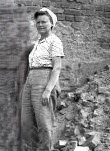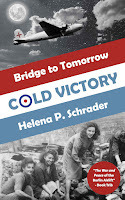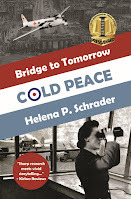Characters of "Cold Victory" : Jasha
Jasha is another character who reminds us of the unspeakable horrors the women of Eastern Europe endured at the hands of two dictators. Her husband and son were murdered by Stalin. She was enslaved by Hitler, and then raped by Soviet soldiers. Yet she is not broken and has found a rare soulmate in an aging British Lt. Colonel of Engineers.
 In this excerpt, Jasha prepares for her wedding and reflects on her life.
In this excerpt, Jasha prepares for her wedding and reflects on her life. Jasha looked atherself in the mirror critically. She did not look like a bride. She wore asleek, three-quarter length gown with matching jacket and hat that while elegantand sophisticated was not bridal. For her first wedding, she’d worn atraditional gown with puffy, white sleeves, and elaborate embroidery on theskirt and bodice that suited her plump and rosy body. But she was not sixteen anymore and years as a slave labourer had left her gaunt. Nor was she marrying in apeasant village in White Russia with aunts, uncles and cousins galore. She wasn’twearing white in the English tradition, either. How could she? She was neitherpure nor innocent. She’d chosen instead a dress in a dusty rose colour, ashes-of-rosesthey called it. That seemed appropriate for a forty-five-year-old widow attemptingto start over on the rubble of the past.
The only problemwith the dress was that she owned no shoes to go with it; she had borrowed apair of low, grey heels from Emily. Together they had stuffed handkerchiefs intothe toes so she could walk in them without falling out. Hopefully, she reflected,she wasn’t trying to step into shoes too large for her on an abstract as wellas a physical level. A quarter of a century ago, the villagers had whisperedand fretted because she was marrying the young schoolteacher Jurek. He was a“stranger” and had gone to university, whereas her parents could hardly read orwrite. The consensus among her neighbours had been that she was getting “aboveherself” and no good would come of it.
They had beenright, Jasha reflected, but not for the reasons they had imagined. Besides, therehad been almost twenty good years before calamity struck. Jurek had taken heraway from the hidebound village. He’d found jobs in larger towns and biggerschools until he got his wish of living and working in Minsk. Long before theyreached Minsk, she had accepted that she would have no additional childrenafter Alojzy was born. She had started working as a cook outside the home tomake extra money. With Alojzy to dote on and worry about, it was easy to ignorethat she and Jurek spent little time together anymore. The passion between themhad definitely cooled, she admitted, and yet, there was nothing fundamentallywrong between them. If — She slammed a door on her thoughts.
Today she wasmarrying Graham and starting a new life. She was not going to let the ghostsinterfere. She was not going to think about what she had lost. She was notgoing to ask herself whether Jurek or Alojzy would have approved. Nor did shewant to think about what happened to her after Stalin murdered her husband andson. She had survived what she called ‘the years of terror’ but at a terriblecost. Yet, as she slipped her rosary into her handbag, she could not forgetthat a neighbour in Minsk had been sentenced to ten years in the Gulag just forowning one. The scars were there. They always would be. She was simplydetermined not to let them cripple her.
Emily Priestmancalled up the stairs, “Are you ready, Jasha? The car is out the front.”
“Yes, I’mcoming.” Jasha picked up the littlewicker suitcase with her change of clothes and toiletries. Graham had bookedthem a room at the Hotel Olympia. She found she was both nervous and excited bythe thought of sleeping with him. It was odd how the act of telling Grahamabout the rapes had freed her of their spell. They had been pushed into thatplace in in her brain alongside Jurek and Alojzy’s murders and her years as aslave, behind that mental door that she kept locked and barred.
She took thestairs slowly, afraid of falling out of her loose shoes, and found Emilywaiting impatiently in the front hall. Yet when Jasha reached the last step, Emilybroke into a smile and exclaimed, “You look lovely!”
“Yes?” Jashaasked back uncertainly. “I do not want to shame Graham. He is British officer. Ido not want to look like peasant or servant.”
“You look likeneither, Jasha,” Emily assured her, meeting her eyes. Then turning around, shepulled a large bouquet of pink roses from the table behind her. “Graham sentyou these,” Emily told her as she handed them over, adding with a wink, “I didtell him the colour of your dress.”
They were so bigand full that Jasha gasped in wonder. Where had he found roses like these inblockaded Berlin? They could only have come from some royal greenhouse in theWest, she thought. Jasha felt tears in her eyes as she buried her nose in theblooms, breathing in their rich scent. Gardening was what had brought themtogether. Surprising her with a bouquet like this was the perfect gesture.
Find out more about the Bridge to Tomorrow series, the awards it has won, and read reviews at: https://helenapschrader.net/bridge-to-tomorrow/






